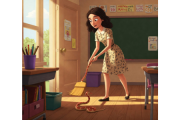Our family was, however, always respectful of other people, no matter their colour. Unlike the locals, my parents didn’t employ African servants, so we didn’t have a “house boy/girl”, nor a “garden boy/girl”, terms used to denote Africans of all ages in those roles. Never did we use the derogatory words employed by many Whites when talking about, or to, Africans: “M***t”, “K******”, “W**”, “N*****”. Each was absolutely forbidden. It is even difficult for me to think about these words here, now. “Voetsak!”, a very impolite word hurled at an animal or at an African servant, to tell it/him/her to leave immediately was equally unacceptable.
So, we had grown accustomed to our new life despite many difficulties along the way. My parents had even made friends with one family to whom we would be invited for tea. Theirs was the only house to which I ever remembering going, though.
By 1959 we were used to the dry season and the rainy season, the latter arriving after “the suicide month” of October when it was so oppressively hot, to be replaced by November’s huge sheets of rain which we could see approaching from afar. Then roads would turn to mud and the rivers would rise dramatically with low-lying bridges becoming impassable under all that water.
It had taken us time to get used to our life in the bush but we had eventually adapted to a new normal in this foreign land. We were still a very close family unit and as far as we children were concerned, this was how it should be. It didn’t worry us that we didn’t have many friends. We had each other and occasionally we invited over the platelayer’s child from next door to play with us.
We were, however, becoming more and more Rhodesian despite ourselves. We children now had Rhodesian-British accents, sometimes flattening our vowels as did the local Whites. We didn’t use the more guttural Afrikaner sounds and vocabulary, though. For instance, I can never remember adding the word “man” when I was talking to someone, but I certainly understood that “Ach, ja, man! Lekker!” simply meant “Oh, yes, my friend (of either gender)! Nice!” We were still considered British by most people, but had changed, no doubt. After all, John and I had been at school for almost two years. Peter would soon be starting school, too, whereas I was getting nearer to the time when I would have to leave Darwendale Junior School. Classes didn’t go beyond Standard V, so at then of that year, I would need to attend a boarding school in Salisbury. I can’t say I recall thinking about this, though.
Life for all of us was chugging along smoothly, or so we thought. All that changed suddenly the day that our parents told us that our family would soon be packing up to leave Darwendale.
What?! Why? When? Where are we going? So many questions rose in my mind.




